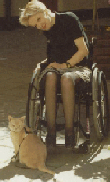The Craving of the Benevolent
 Susanne Berg has been actively involved in the Swedish disability movement since the mid-1980s. She lectures, writes and speaks on a range of subjects from disability history and awareness to accessibility to the physical environment. Susanne sees column writing as therapy, loves her cat and hates 1111descriptions like this.
Susanne Berg has been actively involved in the Swedish disability movement since the mid-1980s. She lectures, writes and speaks on a range of subjects from disability history and awareness to accessibility to the physical environment. Susanne sees column writing as therapy, loves her cat and hates 1111descriptions like this.
Listening to the angry argument between my Swiss friend and our table neighbour I try to look undisturbed; cool, calm and aloof. They are arguing about me, or rather the right to cut my sausages.
This is the day after the seminar, where I have talked about personal assistance. I have described the Swedish legislation; its legally binding right for me to receive direct payment and employ the assistants I need for practical things - like cutting sausages. My table neighbour, one in other situations probably well-behaved elderly lady, lost her politeness and polish at the moment she was denied access to my plate. The aggressiveness she radiates is amazing.
She is obviously regarding me as ungrateful. And of course she has a point. Gratitude is not one of my stronger sides. In fact, I’m probably as bad at gratitude as I’m at cutting sausages.
Later I will encounter the same aggressiveness again. At the airplane I refuse one of the staff to lift me over to the boarding chair alone. No, I want them both to lift me. It’s really a question of safety; but I also do not really feel the urge to be squeezed the way he wants to. He gets really upset and tells me he’s learned to lift people like me in the hospital. Then he chatters away in angry German to his workmate about me refusing his kind service. My German might be bad, but his language is universal.
Whether it’s the right to unemployed cut my food or with full salary assist me to board an aircraft, it’s all about charity. Only charity demands the right to unasked intrude on another person’s meal or impose a personal, non-professional decision on another person’s safety.
Charity is the societal order which give the common man (or woman) the right to uninvited interfere with the way complete strangers eat their lunch, or invade their body territory. It confers this right in the name of inequality. Inequality promotes charity. And charity craves unequal citizens.
It’s the unequal position, the discrimination, the attitude of caring and loving incarceration in institutions, the limited municipal services of poor quality provided on restricted times in restraining fashion, it’s the politically decided and administratively upheld disablement; this is the cause behind charity. This is its defender and justifier.
Disabled people in Switzerland just lost the people’s vote for a constitutional amendment which should have enforced access. They still have no right to direct payment or personal assistance. A large part of their national social security budget goes straight to the institutions where they are forced to exist. And at every street corner in Zürich is yet another bank.
Passing the statue on Bahnhofstrasse I learn that it portrays the Swiss educator Johann Heinrich Pestalozzi and that he coined the saying:
Wohltätigkeit ist das Ersäufen des Rechts im Mistloch der Gnade.
Charity is the drowning of rights in the shithole of mercy.
How right he still is!
by Susanne Berg, May 2003

